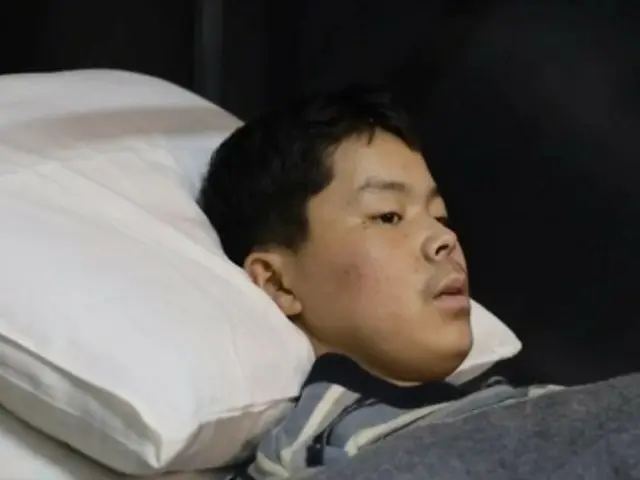They testified that they had been given false information that "South Korean troops deployed to Ukraine were attacking (North Korean soldiers) with drones." One of them also said he was seeking asylum in South Korea.
The South Korean government says, "It is a basic principle to accept all those who seek asylum," but the Geneva Convention states, "Prisoners of war captured during wartime shall be released immediately upon the end of the war and shall not be allowed to return to their home countries."
If a captured North Korean soldier is determined to be a member of the Russian military, the soldier will be repatriated to Russia under the treaty, and it is unclear whether the soldier's wish will be granted.
North Korea's large-scale troop deployment to support Russia was first reported in October last year. In the same month, the city of Jun Jin (Shinhwa), Hamun, and Wonsa in eastern North Korea were hit by a landslide.
From the port of Former Mountain, a Russian transport ship transported North Korean soldiers to Vladivostok in the Far East. It was reported at the time that the soldiers then underwent training at military facilities in eastern Russia.
It has also been confirmed that some of them have participated in combat. North Korea has dispatched more than 10,000 troops so far. The South Korean government has said that about 11,000 North Korean soldiers have been deployed in the Kursk region of western Russia, and that 3,000 have been deployed so far.
The North Korean government has been strengthening its ties with Russia since before the incident, and provided the country with weapons and ammunition prior to the dispatch of its troops.
It has also been reported that the idea was proposed by North Korean leader Kim Jong Eun. In return for providing soldiers, North Korea wants to receive the latest military technology from Russia.
At the time when the news of North Korea's dispatch of troops to Russia was first reported, the government commented that "the recent developments in Russian-North Korean military cooperation will not only lead to a further deterioration of the situation in Ukraine, but will also threaten to take over our country.
"This is a matter of serious concern in terms of the impact it could have on security in the surrounding region," said Deputy Chief Cabinet Secretary Kazuhiko Aoki. "If true, it would demonstrate the remarkable progress being made in ties between the two countries."
"It also shows that Russia is becoming more desperate as it continues to suffer heavy casualties," said State Department spokesman Miller, and the international community expressed concern and criticism.
Last June, Russian President Putin visited North Korea for the first time in 24 years and held a summit with North Korean leader Kim Jong Il.
"It was a scene that foresaw the deepening of cooperation between Russia and North Korea amid international concern over the strengthening of military cooperation between the two countries, which have the same military power. At the meeting, the two leaders discussed whether either Russia or North Korea should go to war.
The two countries signed the Comprehensive Strategic Partnership Treaty, which stipulates that the two countries will provide military assistance in the event of a military conflict. The treaty consists of 23 articles, and Article 4 recognizes the right of collective self-defense under the United Nations.
It states that, in accordance with the Charter and their own laws, "in case either side is attacked by armed force and a state of war is created, the two countries will provide military and other assistance without delay and with all the means at their disposal."
It is believed that Russia's decision to conclude this treaty with North Korea was motivated by its desire to expand military cooperation with North Korea as its military invasion of Ukraine drags on.
Two North Koreans, a sniper and a rifleman in their 20s, who were captured in Ukraine, recently gave an interview to the Chosun Ilbo. The sniper said he was going to study abroad for training.
He said he departed for Russia in early October and said, "I never thought I would be taking part in combat." The man participated in combat in early January this year after training in Vladivostok in the Russian Far East.
The man said he hoped to defect to South Korea, saying, "It was my dream to go to college. I want to make that dream come true." As mentioned above, under international law, prisoners of war captured during hostilities are exempt from the Geneva Convention.
If soldiers sent from North Korea are identified as belonging to the Russian military, they will be repatriated to Russia under the treaty. After being repatriated to Russia, there is a possibility that they will be sent back to North Korea.
On the other hand, the South Korean Constitution stipulates that North Korean soldiers are South Korean citizens. The South Korean Ministry of Foreign Affairs (equivalent to the Ministry of Foreign Affairs) stated, "When a request is made to go to South Korea, we will provide necessary protection in accordance with the basic principle of accepting all of them.
The Ministry of Foreign Affairs stated, "Regarding the repatriation of prisoners of war, international law and practice require that the free will of the individual be respected.
"No person should be deported to a place where he or she would be in danger of being deported."
2025/02/21 13:25 KST
Copyrights(C)wowkorea.jp 2

